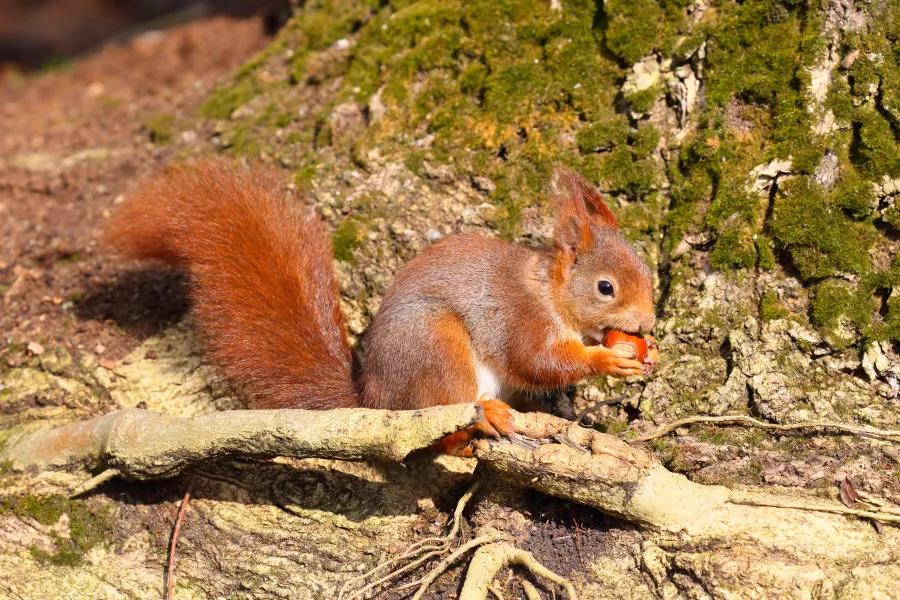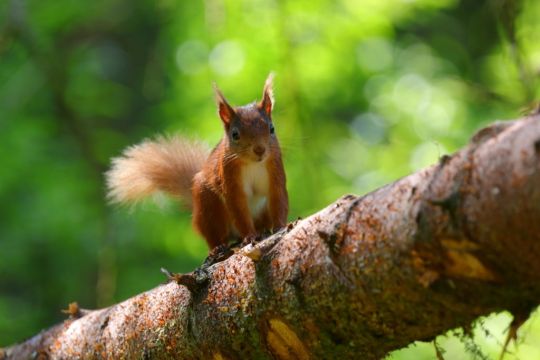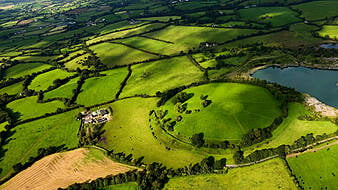With their beautiful red coats, red squirrels have lived in Ireland and the UK for around 10,000 years – but now this lovely creature is only found in limited parts of the countryside.
Larger grey squirrels have won the battle for food and habitat to replace their smaller bushy-tailed cousins across most of England and Wales and The Wildlife Trusts movement warns: “Unfortunately, without conservation management, red squirrels could become extinct in England in approximately 10 years. Time is really running out to save our red squirrels.”
In Ireland, red squirrels have also faced difficulties and Katy Bell, senior conservation officer at Ulster Wildlife, says they “have faced lots of problems across the UK and Ireland because of the introduction of the grey squirrel, which is a non-native, invasive species.”

Bell adds: “They’re not having an easy time of it, along with woodland loss and habitat loss as well.”
Red squirrels are still to be found in Europe, in places such as Germany, Poland, Portugal and Croatia, and in Asian countries including China and Korea.
And closer to home, they can still be spotted in pockets of Wales, parts of England, areas of Ireland and many parts of Scotland.
On Squirrel Appreciation Day (January 21st) – which Dr Mel Tonkin from the Scottish Wildlife Trust says “provides an opportunity to talk about one of the most charming and lively British mammals” – here’s a round up of where you can find red squirrels in the UK and Ireland.
Ireland
Ulster Wildlife have two nature reserves in Glenarm and Straidkilly in Co Antrim where red squirrels can be spotted. If visiting Glenarm, Game of Thrones fans may also want to visit Glenarm Castle, which regularly featured in the TV show.
There are several other places where red squirrels can be found in the North, including Co Derry and Co Armagh.
Other parts of Ireland in which red squirrels can be found include Belleek Wood, Co Mayo – where red squirrels can be found along nature trails – and Derryclare Nature Reserve, Co Galway, where 19 red squirrels were initially introduced to the wood as part of a translocation project in 2005.
Katy Bell says: “In Northern Ireland, our red squirrels are doing quite well at the minute. They’re still in trouble definitely, but they are recovering. So we are seeing lots more of them pop up because of all the conservation work that’s being done on the ground.”
Ulster Wildlife have also launched a red squirrel conservation strategy, which will focus on the long-term aim of conserving red squirrels in Northern Ireland and beyond.
Ms Bell adds that the best time to find red squirrels is “early in the morning when there’s not as many people around, when people aren’t dog walking… be very quiet and look up in the canopies because sometimes you’ll hear them before you see them”.
Scotland

In Scotland, the Saving Scotland’s Red Squirrels (SSRS) project was launched in 2009 to preserve red squirrel levels.
The project is led by the Scottish Wildlife Trust, and partners include NatureScot, Scottish Forestry, Scottish Land & Estates, RSPB Scotland and the Red Squirrel Survival Trust.
Project manager Dr Mel Tonkin says: “Despite significant decline in recent decades, most of the UK’s red squirrels are found in Scotland and there are still many places to see them, from the country estates of the Scottish Borders to the Caledonian pine forests of the Highlands.”
She also says that red squirrels are returning to Aberdeen, and the city’s Hazlehead Park is a popular hotspot for red squirrels.
In order to gain red squirrels’ attention, Tonkin says people can provide food such as “peanuts or shelled hazelnuts”, but should make sure no grey squirrels are nearby.
There are several places where red squirrels can still be found in England, according to the National Trust.

Allen Banks and Staward Gorge, a National Trust property in Northumberland that features ornamental and ancient woodland, is a good place to search for red squirrels and visitors should make sure to keep their eyes up and at the trees. Take on the 2.5 mile Allen Banks Morralee Tarn walk, and you may well spot a red squirrel as you head into the woods.
The National Trust have teamed up with Penrith and District Red Squirrel Group to prevent red squirrel levels from dropping further in the area around Aira Force, a 70 foot waterfall in the Lake District. Visitors are advised to don sturdy footwear to take on one of the trails here and also to arrive early in the morning or later in the evening, as the walks will be quieter and the red squirrels and birds are usually more active at these times.
Meanwhile, the Isle of Wight has no grey squirrels (it’s an offence to introduce them there) and boasts a thriving population of around 3,500 red squirrels. Borthwood Copse, where paths wind through ancient oak woods, is one good place to look for them.
Wales
Sarah-Kay Purdon, mid-Wales red squirrel officer at The Wildlife Trust of South and West Wales, says that there are a few “pockets” left where red squirrels can be found, which include Anglesey and the Clocaenog Forest.
The National Trust has a walk at Plas Newydd House and Garden in Anglesey where nature lovers might see red squirrels, as well as breathtaking views of Snowdonia.
Ms Purdon advises that people should look at the tail of a squirrel if they want to know if they have spotted an elusive red one. She says: “Grey squirrels have a halo effect… where their fur changes colour, whereas red squirrels don’t have that. Their tail tends to be uniform.”







